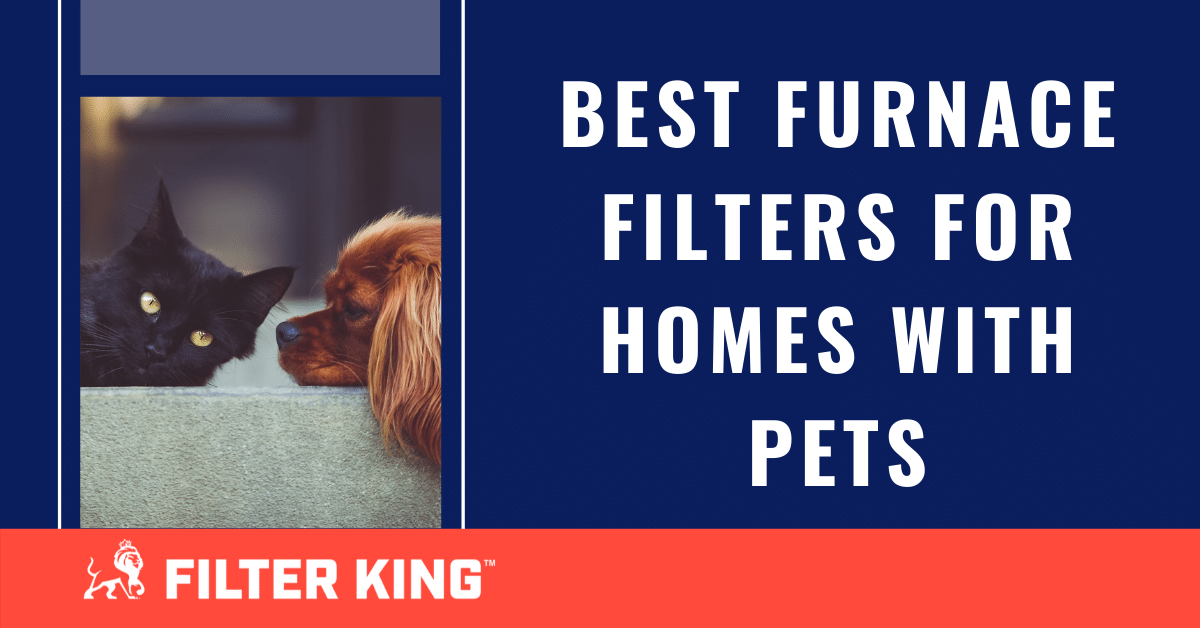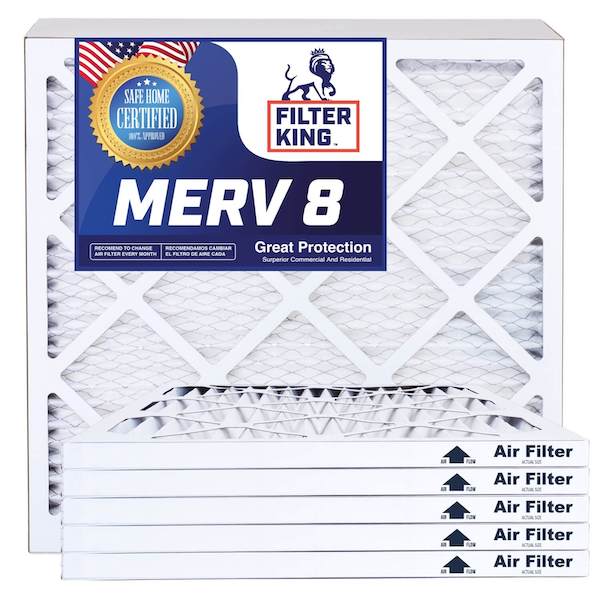Best Furnace Filters for Homes With Pets

Pets are beneficial to home and family. Nevertheless, there’s a drawback to having animals in your household – they reduce a home’s air quality. And some people get highly affected by allergens. So a home with pets is likely to have a lot of fur and dander. But does this mean we get rid of our furry friends?
No, that’s where air filters come in. They’re designed to keep pet dander, fur, and odors out of the air, allowing you to live comfortably with your four-legged buddies. Read on to find out everything you would like to know about the best furnace filters with your pets at home.
Does a Furnace Filter for Pet Allergies Work?
Yes, furnace filters for pet allergens are very effective. When you fit the filter furnace appropriately, it helps lower the number of suspended particles in the air that trigger pet allergies. Your main concern should be to what extent the air filter will remove these unwanted air particles.
Furnace filters come in different construction designs and materials, directly impacting the particles the filter will capture. These features will affect the number of particles the furnace filter will capture and the kind of particles it will remove from the air.
Any standard furnace filter will clean your air in general. However, if other air quality concerns exist, you might consider improving by pairing with an additional filter or using a furnace filter designed to minimize pet allergies.
What to Consider When Buying the Furnace Filters for Homes With Pets
Finding a furnace filter for a home with pets is not so difficult. However, from our extensive research, we came up with various features you should consider to choose the best furnace filter for homes with pets. These include:
1. MERV Rating
The first thing you should look out for is the furnace filter’s MERV (Minimum Efficiency Reporting Value) rating. This rating indicates the extent to which a filter works and the type of air particles it can filter.
Since you’re after a filter furnace for pet dander and allergies, go for one with a higher filter performance rating — MERV 8 to 13. A furnace filter with a MERV above 8 will rid the air in your home of dander effectively, removing approximately 85% of large particles and 50% small particles.
Of course, a higher rating guarantees you better filtration. However, you want a MERV rating that doesn’t exceed 13 to avoid running into airflow issues. A MERV 13 furnace filter will work flawlessly without creating any unnecessary airflow problems, filtering about 95% of large air particles and about 80% of small particles.
2. Size
Size matters when shopping for the best furnace filters for homes with pets. You want a furnace filter that fits into your heating system. Let it be comfortable to slip in and remain put.
You can go through the paperwork your furnace came with to determine the ideal furnace filter to purchase. Alternatively, check your old filter’s measurement. If no size specification is available, measure the thickness, length, and width with a standard tape measure.
3. Price
A filter’s price should go hand in hand with your budget. And the good news is most of the best models are available at an affordable price.
That said, price shouldn’t be the only determinant. Instead, you should look for other features as well.
If you purchase a high-quality furnace filter, you’ll see value for your money. It will have a positive impact on the air quality of your home for a long time.
Therefore, try to avoid low-cost filters because, as the saying cheap is expensive goes, you may have to do regular repairs that may add up to even higher costs in the long run.
4. Maintenance
Some furnace filters are reusable. You rinse them off in your shower or with a garden hose. Once they're dry, you put them back into your unit. Others are disposable, so once they are dirty, you throw them away and use a new one.
If you buy disposable filters, opt for a 4” filter instead of a 1” filter. A 4” filter has a broader surface area to catch particles, making it last longer. It can last three to six months without changing. On the other hand, even the best 1” furnace filters for homes with pets will require that you change them every 30 days.
However, the best option is a high-quality permanent furnace filter that may last up to several months or even years.
The Best Rated Furnace Filters for Homes With Pets
There are a wide variety of furnace air conditioning filters available. Many can reduce pet hair, dust, and dirt. The question is, which one will work best?
There are several highly rated options you may consider, including:
Flat Panel Fiberglass Furnace Filters
A fiberglass furnace filter is a simple, affordable, and disposable option. It will prevent lint and debris from reaching your furnace for up to three months.
Fiberglass filters will not stop smaller particles such as mold spores, pollen, and smoke from entering your HVAC unit. They will still reach your home and affect indoor air quality.
Pleated Furnace Filters
Pleated furnace filters offer superb performance, especially when compared to fiberglass air filters. With the pleating, the filter has a broader surface to trap particles.
Disposable and Permanent Electrostatic Furnace Filters
Disposable electrostatic furnace filters feature electrostatically charged fibers that attract lint, dust, and other tiny particles, ensuring cleaner air flows in your home. We recommend them for households with pets, children, or even smokers.
Permanent electrostatic furnace filters use the same electrostatic technology but contain self-charging cotton fibers that attract particles. Unlike the disposable version, these filters are machine-washable. All you need to do is remove the filter, clean it, and put it back. It lasts for up to eight years.
Activated Carbon Furnace Filters
You may want to consider active carbon filters if the odor is more problematic to you than allergies.
These air filters feature an active carbon layer that attracts odor particles and traps them inside the carbon material. You can also opt to pair this filter with another form of filter that traps dust and microorganisms while this one keeps toxins out of your home’s air.
HEPA
A High-Efficiency Particulate Air filter (HEPA) is an excellent choice of furnace filters for homes with pets and is commonly used because they’re highly effective. They can trap up to 99.97% of airborne particles, including those as small as 0.3 microns.
Additionally, they can effectively capture about 95% of particles as small as 0.1 microns.
For this reason, many medical experts recommend HEPA furnace filters to people allergic to allergens, debris, or dust because of their excellent capabilities. Whether it’s pet fur, pollen, mold, dust mite debris, or bacteria, HEPA filters will capture it all.
For additional filtration of smoke, chemical, odors, and gases, consider pairing HEPA filters with activated carbon filters. That way, you’ll have exhaustive coverage of all air pollutants in your home.
FAQs
Below are some frequently asked questions about furnace filters for homes with pets:
Can a Furnace Filter Really Reduce Pet Dander and Dust?
It may seem insane, but yes, such a simple filter can do that much for you.
However, remember only a furnace filter with a MERV 8 to MERV 13 rating will serve this purpose effectively, with the latter offering superior filtration.
How Often Should You Change the Furnace Filter for a Home With Pets?
You should clean or replace your furnace’s air filter at least once a month if your home has pets. With extra air filtration measures, you can extend this by several weeks.
How Can I Repair My Furnace Filter?
Your filter may clog and harm some of its internal components. Should this happen, replace the filter and seek the assistance of HVAC (heating, ventilation, and air conditioning) technicians. The HVAC system professional will do some basic repairs and prevent the device from completely failing.
Take Away
Now you understand better about furnace filters for homes with pets. You know what to consider when buying a furnace filter and some highly rated filter types in the market. So go ahead and remove the airborne contaminants in your home air and fight those allergic reactions.
 14x18x1
14x18x1

